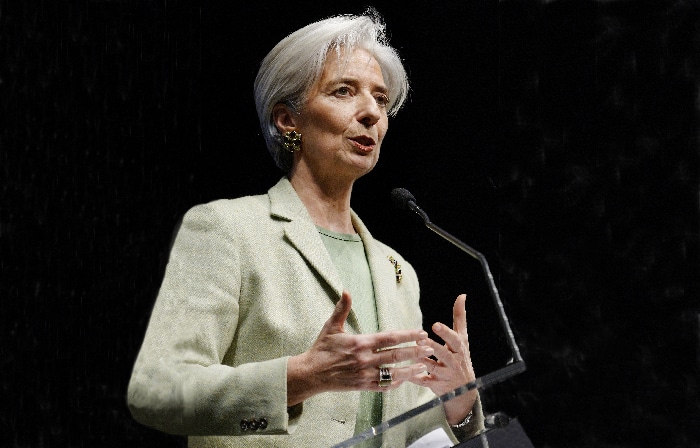The president of the European Central Bank, Christine Lagarde, said on Wednesday that it was “highly unlikely” that the bank would raise its key interest rates in 2022, as other major central banks prepare to tighten their monetary policy.
ECB: a rate hike in 2022 is “very unlikely”, says Lagarde
The president of the European Central Bank, Christine Lagarde, said on Wednesday that it was “highly unlikely” that the bank would raise its key interest rates in 2022, as other major central banks prepare to tighten their monetary policy.
Despite the current inflationary surge in the eurozone, the “medium-term inflation outlook remains modest” so that “the conditions for a rate hike” will not be met next year, explained the Frenchwoman in a speech in Lisbon.
The ECB wants to maintain favourable financing conditions for households and businesses so as not to jeopardise the still fragile recovery.
“An undue tightening of financing conditions is not desirable at a time when purchasing power is already being squeezed by rising energy and fuel bills”, and would represent an “undesirable headwind for the recovery”, Ms Lagarde said.
She thus pushed back market expectations, which see a first rate hike in December 2022, more clearly than at the institute’s last press conference at the end of October.
The stronger-than-expected rise in eurozone inflation, to 4.1% year-on-year in September, the highest rate of price increases for more than 13 years, has put pressure on the ECB to react.
But for now, the bank expects inflation to fall back in 2022 and only reach 1.5% in 2023, still far from its 2% target.
However, the inflation forecast for the following year and the one after that would have to be within its target before the ECB would start to react on rates.
The markets’ attention will be focused this Wednesday on the US Fed, which is meeting its monetary policy committee.
While the ECB has opted for a wait-and-see approach to inflation, preferring to continue to support the economy as the recovery falters, the Fed announced on Wednesday that it would start reducing its bond purchases on the markets this month, with the aim of stopping them definitively in mid-2022.
And as early as Thursday, the Bank of England (BoE) could raise its key rate for the first time since August 2018.
The ECB sees a good reason to delay in its young history. Ten years ago, its former president Jean-Claude Trichet raised rates too early, just as the crisis was about to hit, a mistake quickly corrected by his successor Mario Draghi, but one that has remained in the annals of the institution.













 English
English French
French Spanish
Spanish German
German Dutch
Dutch Italian
Italian Danish
Danish Portuguese
Portuguese Greek
Greek Russian
Russian Swedish
Swedish Bulgarian
Bulgarian Hungarian
Hungarian Catalan
Catalan Ukrainian
Ukrainian Polish
Polish Basque
Basque Chinese (Simplified)
Chinese (Simplified) Japanese
Japanese Hebrew
Hebrew Arabic
Arabic Swahili
Swahili Amharic
Amharic Irish
Irish Afrikaans
Afrikaans Albanian
Albanian Armenian
Armenian Azerbaijani
Azerbaijani Belarusian
Belarusian Bengali
Bengali Bosnian
Bosnian Cebuano
Cebuano Chichewa
Chichewa Chinese (Traditional)
Chinese (Traditional) Corsican
Corsican Croatian
Croatian Czech
Czech Esperanto
Esperanto Estonian
Estonian Filipino
Filipino Finnish
Finnish Frisian
Frisian Galician
Galician Georgian
Georgian Gujarati
Gujarati Haitian Creole
Haitian Creole Hausa
Hausa Hawaiian
Hawaiian Hindi
Hindi Hmong
Hmong Icelandic
Icelandic Igbo
Igbo Indonesian
Indonesian Javanese
Javanese Kannada
Kannada Kazakh
Kazakh Khmer
Khmer Korean
Korean Kurdish (Kurmanji)
Kurdish (Kurmanji) Kyrgyz
Kyrgyz Lao
Lao Latin
Latin Latvian
Latvian Lithuanian
Lithuanian Luxembourgish
Luxembourgish Macedonian
Macedonian Malagasy
Malagasy Malay
Malay Malayalam
Malayalam Maltese
Maltese Maori
Maori Marathi
Marathi Mongolian
Mongolian Myanmar (Burmese)
Myanmar (Burmese) Nepali
Nepali Norwegian
Norwegian Pashto
Pashto Persian
Persian Punjabi
Punjabi Romanian
Romanian Samoan
Samoan Scottish Gaelic
Scottish Gaelic Serbian
Serbian Sesotho
Sesotho Shona
Shona Sindhi
Sindhi Sinhala
Sinhala Slovak
Slovak Slovenian
Slovenian Somali
Somali Sundanese
Sundanese Tajik
Tajik Tamil
Tamil Telugu
Telugu Thai
Thai Turkish
Turkish Urdu
Urdu Uzbek
Uzbek Vietnamese
Vietnamese Welsh
Welsh Xhosa
Xhosa Yiddish
Yiddish Yoruba
Yoruba Zulu
Zulu